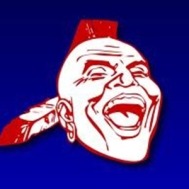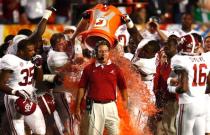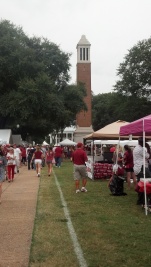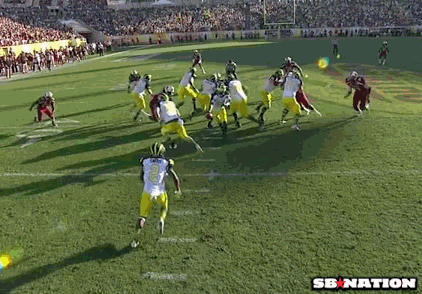Once there was a land that lay, green and rolling, between a long chain of mountains and a turbulent sea. This land held only a couple of real cities, but a lot of jumped-up towns. The people who lived in this land didn’t much care for one another, by and large – not for the ones who lived in the land’s far corners, nor for those right across the state lines, nor even for their next-door neighbors, sometimes. To a visitor the people of the land seemed more or less alike, but a native could go on for hours about the foreign, foolish, and downright immoral ways of those who preferred to wear different colors.
But for all they saw as foreignness – because of all they saw as foreignness – nearly everybody in this land came together every year, just before spring sprung, to cease all daily business and watch the champions of their preferred colors compete in a tournament so all-consuming that they just called it the Tournament, in a shared disdain for all other multi-competitor competitions settled in single-elimination or round-robin fashion.
The Tournament was three high holy days, three feast days, all in a row. Friends and families gathered to wear their preferred colors in close proximity and eat traditional foods. The outcomes made stone-hearted men weep with joy or despair.
Things changed. The land improved its commerce with the greater nation. Natives moved away. Newcomers, who knew little of the old ways and cared even less, came, with cables and satellite dishes that let them keep track of distant loyalties. The land itself pushed against its old horizons, and this was not a bad thing. But the land became less of a land, less cohesive and neighborly. Fewer and fewer in the land cared about the Tournament, and nobody cared as much.
___________________
I honestly don’t remember what grade I was in, the first time the teacher brought in a TV, one Friday in early March, turned it on at noon, and spent the rest of the day letting us watch the first two games of the ACC Tournament1. It may have been kindergarten, and every year after. I don’t remember because I did not think to notice, it seemed so commonplace, so not unexpected. In the North Carolina Piedmont, in the 1970s, even small children knew about the Tournament.
We knew about the Tournament; we had heard our parents speak of it. We may have not yet heard them talk about David Thompson and Len Elmore, and we had not yet heard of Ralph Sampson or Johnny Dawkins, but we’d heard them talk about the Tournament. We’d heard the name, just like we’d heard the names Lefty Driesell, Phil Ford, the Pilot. At the time, I wasn’t sure if “Dean” was the name or the title of UNC’s Smith; I just knew that when Smith coached the U.S. Olympic team, my father rooted for the Russians.
As best as I can recall, I was in college – at an ACC school, of course – before I found out that halting class to watch basketball games was not ordinary. I remember some years growing up when the teacher didn’t get to the A/V Room sign-up sheet in time, and she’d ask the class if anyone could bring in a TV that Friday. We’d plug it in and play with the rabbit ears until we picked up WFMY, at least in elementary school. In middle school, we’d find WRAL; by high school, we found WSPA. My family moved around the Carolinas, but the Tournament was a constant.
____________________
Others can tell you about the games themselves, the players, the moments: Lennie Rosenbluth in ’57; State and Maryland in overtime in ’74; Randolph Childress’s game- and Tournament-winner in ’95. Books and YouTube record the games and the plays; they are fixed points in so many memories, easy to recall and relate. I’m after something more fragile and subjective, something easier to lose. I’m concerned with the effect of those moments. I’m concerned with the land that gave those moments their effect.
For its first 21 years, only the winner of the Tournament got to represent the ACC in the NCAA’s tournament, and play for a national championship. All those great teams would gather for the Tournament, and by Sunday afternoon, all but one would be done for the year. Then in 1975 the NCAA expanded its tournament to 32 teams, which was great, because great ACC teams that didn’t win the conference could still win the national title, like Duke did in 1991, or Carolina did the last three times it won the NCAAs. We recognized that it would be a diminishment, but we didn’t notice any, at least not at first.
Then in 1979, Magic Johnson and Larry Bird practically invented the concept of March Madness, and the realization of how much fun betting on a month-long tournament can be spread across the country like a virus, and someone called the NCAA Tournament “the Big Dance,” and the name stuck. The name stuck on Tobacco Road, too, and ACC teams added much to the madness – UNC and NC State won it all, back to back, in 1982 and ’83; Georgia Tech made the Final Four in 1990; Duke reached the Final Four five straight years, and won in ’91 and ‘92; Carolina (or Chris Webber?) won Dean Smith another title in ‘93, and won two for Roy Williams in 2005 and 2009; Maryland won the NCAA title in 2002. We wanted our teams to win the Tournament, but of course we wanted them to win the national title more, and we knew that lessened the Tournament, but in March we didn’t much care. Ol’ Roy even came out and said that he considered the Tournament a distraction, a detriment, an extraneous demand on teams with sights set on bigger goals.
Outside the arenas, Tobacco Road transformed, starting with the tobacco that, by the turn of the century, hardly grew around here at all. I’m not saying that’s a bad thing. Even if we still wanted to farm tobacco, we’d be hard pressed to find a patch of unoccupied, unpaved soil between Raleigh and Winston-Salem to grow it in. North Carolina’s jumped-up towns grew into cities, and its villages grew into jumped-up towns, and the whole state filled to bursting. Now, a North Carolinian’s neighbors are as likely to while away the winter following – Lordy mercy – hockey as college basketball, and most natives don’t have the slightest idea how to trash talk over hockey.
The same thing was happening in Atlanta and in that marble town outside College Park, Maryland. Clemson and Florida State had always been football-first schools, tokens of deep-South SEC culture in the upper-South ACC. Virginia had a long dry spell after firing Terry Holland, and their focus seemed to shift north. They seemed to want to be the “public Ivy” more than they wanted to be in the Kudzu League2, and I have a hard time imagining 2013’s most famous Wahoo stopping production on 30 Rock to watch the Tournament3.
I’m not saying that’s a bad thing, necessarily. But for several years now, the TV cameras can’t help but find the empty seats, even though the Tournament hasn’t opened ticket sales to the general public since 1966. Few care to take a Thursday off to watch the opening rounds. The Tournament, as an event, lacks not just the urgency, but the festivity it once had.
Then the macroeconomics of the industry once known as “college sports” pushed the ACC to poach its Yankee rival, the Big East, taking first Miami, Boston College, and Virginia Tech, and then Pittsburgh and Syracuse, in order to “expand its media footprint,” and now please excuse me while I go wash my fingertips for typing that phrase. That expansion, at least, made geographic sense; with the announced additions of Louisville and Notre Dame, though, the Atlantic Coast Conference broke down its old boundaries – and the logic of its name – with a terrible crash.
Keep in mind, though, that we live in a world in which the Big Ten will soon have 14 member schools, divided into “Legends” and “Leaders.” One of those schools is ACC charter member Maryland. I’m not saying that’s a bad thing, at all.
I’m not saying that any bit of this is a bad thing; it’s only basketball, after all, and I’m just being sentimental. The ACC and its Tournament – the way they used to be, with the full passion they could inspire, and the sense of shared identity (or even – dare I say it? – of purpose, for a time) they could foster – will be another cherished childhood memory that’s only a memory, another much-loved pastime that’s a thing of the past. The schools of the ACC will continue to play basketball (or try to, in some cases), and I’ll still watch. I’ll be one of those crotchety old-timers complaining that it ain’t like it used to be, just like the ones who used to tell me that the Tournament ain’t like it was back in the days of the single bid, or back when they held it in Reynolds Coliseum. I’ll tell some young fans about my teachers bringing in TVs to watch the Tournament in school, and they’ll look at me the way I looked at my father when he told me they let school out for two weeks in the fall so kids could help bring in the tobacco crop.
I’m not saying that’s a bad thing. I’m not even completely sure that it’s a damn shame.
1 The Atlantic Coast Conference men’s basketball tournament, just in case I need to specify.
2 The unofficial roster of high-prestige universities in the South, and a topic deserving of its own post one of these days.
3 Let me know if I’m wrong, Tina.











